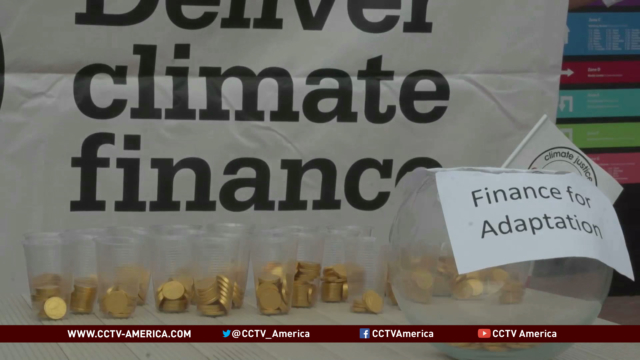A new United Nations report warned that the cost of adapting to a warmer world is soaring for developing nations and funding is falling short. CCTV America’s Dan Collyns reported this story from the U.N. climate negotiations currently underway in Lima, Peru.

This summit risked failure if rich countries could not define how they would compensate poorer countries for climate change.
Twenty-two developed nations have pledged almost $10 billion to the Green Climate Fund to help poor nations cope with global warming, however the goal was ten times that amount.
The goal is still achievable, despite the lack of progress, Samantha Smith, leader of the World Wide Fund for Nature’s global climate and energy initiative, said.
“It’s not just about the money, but also about trust and confidence in the negotiations,” Smith said. “So developing countries have been waiting for this money since 2009 to hear where the money will come from, and that has not happened here.”
After last month’s historic commitment to cut greenhouse gases, China remains concerned about the amount of money that still needs to be raised.
“The objective for the 2020 is the provision of $100 billion per year by 2020, so $10 billion is just one tenth of that objective. Yet, we do not have any clear road-map or clear picture of meeting that target by 2020,” head of China’s delegation at the U.N. conference Su Wei said.
The least-developed nations and small islands are likely to be most affected by climate change. They said they’ve been waiting for years for financial help.
“The trickle-down effect to each government in the Pacific is very slow, but we can’t abandon the process at this stage,” delegate Netatua Pelesikoti of Tonga said.
Climate finance is becoming the issue defining this conference. Pressure is mounting on developed nations to come up with the cash to compensate poorer ones. Negotiators at this summit said failure was not an option.
Australia has been singled out for failing to contribute, while Japan has used funds, earmarked for global warming, on three new coal plants in Indonesia, a move that United Nations environmental chiefs disapprove of as they wanted investment in renewable energy sources.
The U.N. warned that without early efforts to fund climate change, the gap between what has happened and what needs to happen will only widen.
Insurance regulator asks firms if they’re prepared for climate change
The Bank of England has become the first central bank in the world to formally ask if the insurance industry is prepared for the financial fallout from global warming. The bank wrote to 30 of Britain’s biggest insurance firms to assess whether they were ready for a possible wave of losses from extreme weather. CCTV America’s Richard Bestic reported this story from London.

It was a highly unusual move for the bank, which serves as the regulator for Britain’s $3 trillion insurance industry.
With the growing number of catastrophic storms around the world, the Bank’s concern about the potential of climate change to wreak havoc is not unfounded.
U.K.’s insurance industry, the third-largest in the world, responded that they are indeed tracking the potential threat.
“Insurers are increasingly seeing climate change become apparent in the claims they pay out,” Matt Cullen, the head of strategy at the British Association of Insurers said. “They understand that climate change is a very important issue, and they are making efforts to ensure that thinking is incorporated into their way of doing business.”
Cullen said insurance companies should be cognizant of how much capital they have to manage risk from expensive catastrophic events.
“That can be managed to an extent by diversifying your portfolio, by managing risks and spreading risks, but ultimately there will be an impact on the capitalization that insurers need,” Cullen said.
Dictating that level of capitalization could fall to insurance industry regulators at the Bank of England.
The bank’s letter to the Britain’s insurance industry was seen as a stress test to see if their business models can survive global warming and an example of how the financial implications of global warming are now mainstream.
Author McKenzie Funk discusses business of climate change
For more the impact of climate change, CCTV America interviewed McKenzie Funk, author of “Windfall: The Booming Business of Global Warming.” Funk believes many people and places will benefit from climate change.

 CGTN America
CGTN America
